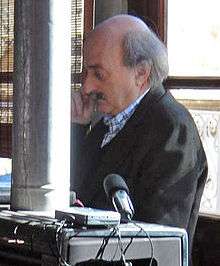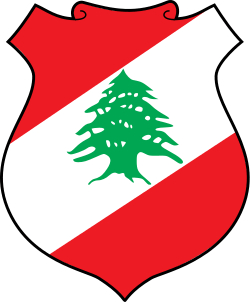Walid Jumblatt
Walid Bey Jumblatt (Arabic: وليد بك جنبلاط; born 7 August 1949) is a veteran Lebanese politician, one of the leaders of Lebanon's Druze,[1] president of the Progressive Socialist Party.[2]
Walid Jumblatt وليد بيك جنبلاط | |
|---|---|
 Walid Jumblatt in 2006 | |
| Born | 7 August 1949 |
| Nationality | Lebanese |
| Occupation | Politician |
| Home town | Moukhtara |
| Office | Head of the Jumblatt family |
| Predecessor | Kamal Jumblatt |
| Successor | Taymour Jumblatt |
| Political party | Progressive Socialist Party |
| Spouse(s) | Nora Jumblatt |
| Children | Taymour (born 1982) Aslan (born 1983) Dalia (born 1989) |
| Parent(s) | Kamal Bey Jumblatt Emira May Arslan |
| Relatives | Emir Shakib Arslan (grandfather) |
 |
|---|
| This article is part of a series on the politics and government of Lebanon |
|
|
|
|
Other issues
|
|
|
Early life and education
He was born in August 1949[3][4], the son of PSP's founder Kamal Jumblatt. He is the maternal grandson of Emir Shakib Arslan.[5] Walid Jumblatt graduated from the American University of Beirut with a bachelor's degree in political science and public administration in 1972.[6][7][8]
Career
Upon graduation, Jumblatt worked as a reporter for An Nahar in Beirut.[8] The BBC describes Jumblatt as "leader of Lebanon's most powerful Druze clan and heir to a leftist political dynasty based around the Progressive Socialist Party".[9] Assem Qanso of the Arab Socialist Ba'ath Party of Lebanon accused Jumblatt of abandoning his father's beliefs.[10] On 12 January 1982, he survived a car bomb explosion near his house in Beirut during the Lebanese Civil War.[11] In July 1983, after Amine Gemayel became president, Suleiman Frangieh, Rashid Karami and Walid Jumblatt formed a Syrian-backed National Salvation Front to challenge Gemayel's rule and the pact between Lebanon and Israel that was financially supported by the US.[12] Jumblatt served as minister of public works, transport and tourism in the National Unity cabinet led by then prime minister Rashid Karami, which was formed in May 1984.[13] His main ally during the war was Amal Movement's leader, Nabih Berri.
He was a supporter of Syria, but following the death of Syrian President Hafez Assad in 2000, he campaigned for Damascus to relinquish control.[14] Jumblatt's close links with the Syrian old guard alienated him from the new presidency of Bashar al-Assad.[14] This pitted him against then president Émile Lahoud and the Lebanese Shiite party Hezbollah of which he said: "Their fighters have done a good job defying and defeating the Israeli army, OK, but the question we ask is where their allegiance goes: to a Lebanese strong central authority or somewhere else?"[15] In the 2009 general elections, Jumblatt won a seat from Shouf as part of the 14 March Alliance list.[16] Following issues with Hezbollah's community, his son Taymour Jumblatt fled to France with his family after multiple death threats which prevented him from joining the local political scene.
With the onset of the Syrian Civil War, Jumblatt and the PSP moved towards an anti-Assad stance.[17][18] Jumblatt has been crucial in negotiations regarding the Syrian Druze during the Syrian Civil War, and has stated about al-Nusra Front "I cannot classify, like Western countries, Nusra as terrorist because most of Nusra are Syrians. The regime of Bashar obliged the Syrians to join Nusra".[19] After al-Nusra Front allegedly killed 20 Druze villagers in Qalb Loze on 10 June 2015, Jumblatt responded that "Any inciting rhetoric will not be beneficial, and you should remember that Bashar Assad’s policies pushed Syria into this chaos".[20]
Walid Jumblatt believes that the order to kill his father came from Hafez al-Assad.[21] He said he would rather "commit a political suicide" than reconcile with his son Bashar al-Assad.[22]
In 2014, Walid Jumblatt declared himself in favor of the legalisation of cannabis in Lebanon.[23] In 2015, he admitted hiding the Swedish spy Stig Bergling during the early 1990s in a remote place in Lebanon upon the request of Russian authorities.[24] On 4–7 May 2015, Jumblatt testified at the Special Tribunal for Lebanon related to the investigations of the assassination of Rafic Hariri.[25]
In May 2017, the trial of four men accused of conspiring to assassinate Walid Jumblatt began.[26]
Personal life
Jumblatt at twenty intended to marry an Iranian actress, who was older than him.[8] His father did not endorse the marriage.[8] In 1981, Jumblatt married Gervette,[27] a Jordanian of Circassian descent. Together they had three children: Taymour, Aslan, and Dalia. Later on, he married Nora al-Sharabati, daughter of Ahmad al-Sharabati.
In 2018, his son Taymour W. Jumblatt replaced him as a candidate for parliamentary elections.[28][29]
In popular culture and arts
Like many political leaders, Jumblatt has been the subject of photography since the late 1970s.[30] The photographer Ziad Antar made a portrait of him using an old expired film, which produced a ghosty effect. The image is said to evoke the danger the Lebanese Druze leader faces after he had criticized Hezbollah and the Syrian government.[31]
See also
- Cedar Revolution
- Druze in Lebanon
- Lebanese Civil War
- Lebanese National Movement
- Mountain War (Lebanon)
- People’s Liberation Army (Lebanon)
References
- "After Syria". The New Yorker.
- "Walid Jumblatt's exit could weaken U.S.-backed coalition". Los Angeles Times. 3 August 2009. Retrieved 13 August 2011.
- Dominique Avon; Anaïs-Trissa Khatchadourian; Jane Marie Todd (10 September 2012). Hezbollah: A History of the "Party of God". Harvard University Press. p. 204. ISBN 978-0-674-06752-3. Retrieved 14 April 2013.
- Bernard Reich (1990). Political leaders of the contemporary Middle East and North Africa: a biographical dictionary. Greenwood Publishing Group. p. 528. ISBN 978-0-313-26213-5. Retrieved 14 April 2013.
- "Kamal Jumblatt". NNDB. Retrieved 13 August 2011.
- "Lebanon's new miracle" (in French). 1st Jordan. Retrieved 13 August 2011.
- "Jumblatt's family history captured in a painting". Lebanonwire. 30 November 2002. Retrieved 13 August 2011.
- Glass, Charles (1 March 2007). "The lord of no man's land: A guided tour through Lebanon's ceaseless war". Harper's Magazine. Archived from the original on 8 February 2013. Retrieved 9 April 2013.
- "Who's who in Lebanon". BBC News. 14 March 2005. Retrieved 13 August 2011.
- "Qanso: Jumblatt abandoned his father's principles". NOW Lebanon. 6 February 2012. Retrieved 16 February 2012.
- "Hezbollah's moves against Druze stalwart flirts with a return to Lebanon's dark days". The National. 22 July 2019.
- "Anti-Gemayel 'front' formed in Lebanon". The Milwaukee Journal. 23 July 1983. Retrieved 23 March 2013.
- Owen, Roger (October 1984). "The Lebanese Crisis: Fragmentation or Reconciliation?". Third World Quarterly. 6 (4): 934–949. doi:10.1080/01436598408419807. JSTOR 3991803.
- Gambill, Gary C.; Elie Abou Aoun (August 2000). "Special Report: How Syria Orchestrates Lebanon's Elections". Middle East Intelligence Bulletin. 2 (7). Retrieved 17 March 2013.
- Chicago Tibune interview, 11 August 2006.
- "New parliament composition" (PDF). Lebanese Information Center. Retrieved 21 January 2013.
- "PSP to Rally in Support of Syrian People, Expulsion of Syrian Ambassador". Retrieved 3 September 2012.
- "PSP Demo Urges Syria Envoy Expulsion, Arrest of Syrians in Samaha Case". Retrieved 3 September 2012.
- Teofimov, Yaroslav (11 June 2015). "To U.S. Allies, Al Qaeda Affiliate in Syria Becomes the Lesser Evil". The Wall Street Journal. Retrieved 11 June 2015.
'I cannot classify, like Western countries, Nusra as terrorist because most of Nusra are Syrians. The terrorist regime of Bashar obliged the Syrians to join Nusra,' said Walid Jumblatt, a prominent Lebanese politician and a leader of the Druze community who has been negotiating with Nusra over the security of Druse villagers in Idlib.
- "Killings of Syrian Druze draws wide condemnation". Daily Star. 12 June 2015.
- Robert Fisk, On the 40th anniversary of Kamal Jumblatt's death, is trouble brewing again in Lebanon?, Independent, 19 March 2017
- Michael Young, Walid Jumblatt hunkers down in survival mode, The National, 21 September 2016
- Druze leader Jumblatt calls to ‘legalise hashish in Lebanon’, Middleeasteye.com.lb, 15 December 2014
- Robert Fisk, The curious tale of the Swedish Soviet spy and the sheltering Druze, Independent, 8 February 2015
- "Lebanon's Walid Jumblatt testifies in Rafiq Hariri tribunal". Al Arabiya. 4 May 2015.
- Trial of Jumblatt would-be assassins begins, Daily Star, 11 May 2017
- "Beirut Leader Survives Bombing". The Washington Post. 2 December 1982.
- "Taymour Walid Jumblatt will succeed his father in the 2017 elections". Dailystar.com. 5 March 2017.
- Ellen Francis; Tom Perry (20 March 2017). "Lebanon's Walid Jumblatt affirms son as political heir". Alarabiya.net.
- "Political poster of Walid Jumblatt, leader of the Druze community and Pt of the Socialist Progressive Party". Magnum Photos. Retrieved 23 March 2012.
- Andrew Pulver (9 March 2011). "Photographer Ziad Antar's best shot". The Guardian. Retrieved 23 March 2012.
External links
| Wikiquote has quotations related to: Walid Jumblatt |
- Appearances on C-SPAN
- Walid Jumblatt on Charlie Rose
- Walid Jumblatt on IMDb
- Walid Jumblatt collected news and commentary at Al Jazeera English
- Walid Jumblatt collected news and commentary at The Jerusalem Post
- Walid Jumblatt, by Gary C. Gambill and Daniel Nassif, Middle East Intelligence Bulletin, Vol 3, No 5, May 2001
- "It's strange for me to say it, but this process of change has started because of the American invasion of Iraq" quoted in Beirut's Berlin Wall, by David Ignatius, Washington Post, 23 February 2005